|
ISLAM |
Compiled By Latheef Farook |
Nat Geo Museum celebrates Scientific Achievements of Muslim
Civilization
The award-winning interactive exhibition, 1001 Inventions, arrived in
the US capital on August 3 introducing brand new audiences to the Golden
Age of Muslim Civilization.
|
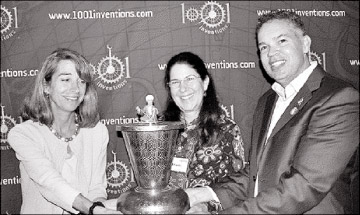
From left National Geographic VP Kathryn Kean receives the
“Scribe Clock” from CSC VPs Dr. Diane Perlov and William Harris |
The ground-breaking scientific and cultural achievements of this era,
from the 7th to the 17th centuries, will be introduced to visitors to
the National Geographic Museum for six months, starting this summer.
1001 Inventions: Discover the Golden Age of Muslim Civilization is a
blockbuster traveling exhibition that highlights the enormous
contribution to science and technology made by men and women of many
different faiths in Muslim Civilization. The exhibition opened on August
3 and runs through February 3, 2013.
“Muslim civilization stretched from southern Spain as far as China,”
explains Producer and Director of 1001 Inventions Ahmed Salim.
“For a thousand years, scholars of many faiths built on the ancient
knowledge of the Egyptians, Greeks and Romans, making breakthroughs that
helped pave the way for the Renaissance. The discoveries made by men and
women in Muslim civilization - from automatic machines and medical
marvels to astronomical observations and inspiring architecture - have
left their mark on the way we live today.”
1001 Inventions is a global educational initiative that promotes
awareness of scientific and cultural achievements from the ‘Golden Age’
of Muslim Civilization and how those contributions helped build the
foundations of our modern world. The 1001 Inventions exhibition was
named the Best Touring Exhibition of the Year at the Museums and
Heritage Excellence Awards in 2011. This highly interactive exhibition
showcases the historic advancements in navigation, medicine, hydraulics,
optics, mathematics and more. 1001 Inventions has drawn millions of
visitors at blockbuster residencies in London, Istanbul, New York and
Abu Dhabi. A further 500,000 people saw the exhibition at the California
Science Center in Los Angeles, where it closed in late April. The
‘Global Strategic Partner’ for 1001 Inventions is Abdul Latif Jameel
Community Initiatives, which has sponsored the exhibition and its
international tour.
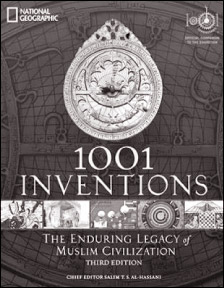
Spreading knowledge
Centerpiece of the exhibition is a model of celebrated Ottoman
engineer Al-Jazari’s sophisticated Elephant Clock, created more than 800
years ago. The clock was a masterpiece celebrating the diversity of
humankind and incorporating features from Indian, Egyptian, Greek,
Chinese and Arabian cultures. The clock cleverly reflected cultural and
technological influences from across Muslim Civilisation, from Spain to
China. “The mission of National Geographic is to spread knowledge of the
world and its cultures - past and present,” said Kathryn Keane, Vice
President of Exhibitions at the National Geographic Society. “This
exhibition is an opportunity to share the fascinating history of Muslim
civilization with our audiences and to celebrate great scientific
achievement and innovation.” The exhibition also features
energy-efficient houses constructed more than 1,500 years ago. The
houses incorporated natural cooling elements in their design, such as
double-glazed windows, thick external walls and air-scoops for natural
cross ventilation. Illustrations of the various houses are highlighted
throughout the exhibition to show how our current energy-efficient
houses use this same technology today.
The work of influential scientists, such as physicist Ibn al-Haytham,
is featured in the exhibition. Al-Haytham’s ideas about optics
overturned the ancient theory that our eyes send out invisible rays in
order to see. He proved his theory of light rays being reflected from
visible objects to build the first camera obscura. The exhibition
includes camera obscura examples and other advancements in optics,
showing how early people came to understand the complex concepts behind
vision.
In addition to these larger-scale inventions, 1001 Inventions
features many everyday objects that many do not know were invented by
the men and women of the medieval Muslim Civilization. Items such as
perfume, fabrics, chess games and more are featured to show visitors the
importance of past inventions on our daily lives today.
In conjunction with the museum exhibition, the National Geographic
Museum will host the 1001 Inventions Family Festival on 8th Sept. 2012
from 10am to 4pm. This outdoor festival will include performances, music
and dance workshops, hands-on art activities, tastings, demonstrations
and a craft bazaar. In addition, admission to the museum will be free
all day. The festival is supported by a grant from the Doris Duke
Foundation for Islamic Art.
Enduring legacy
National Geographic Books recently published the companion book to
the exhibition, “1001 Inventions: The Enduring Legacy of Muslim
Civilization”, that delves into some of the most important inventions
from the period.
1001 Inventions
1001 Inventions is a leading and award-winning international science
and cultural heritage brand reaching over 50 million people. The Muslim
civilisation stretched from Spain to China. From the 7th century
onwards, men and women of different faiths and cultures built on
knowledge from ancient civilisations, making breakthroughs that have
left their mark on our world.
1001 Inventions is supported by the UK-based Foundation for Science,
Technology and Civilisation, an international network of academic
experts, as its Global Knowledge Partner. Additional support comes from
the Abdul Latif Jameel Community Initiatives, philanthropic arm of the
ALJ Group of companies, which serves as the Global Strategic Partner of
1001 Inventions.
1001 Inventions is based on two decades of research by more than a
hundred leading academics and educationalists from around the world. The
content of the 1001 Inventions exhibition was reviewed and approved by
an independent panel of academics from the London Science Museum and was
also reviewed by academic experts retained by California Science Center.
Islam 6” National Geographic releases the third edition of 1001
Inventions book
Glimpse at the foundations of Human Rights laid by Islam
Islam provides many Human Rights for the individual. The following
are some of these Human Rights that Islam protects.
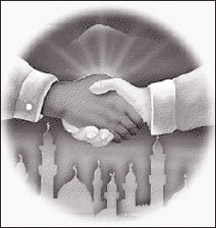
The life and property of all citizens in an Islamic state are
considered sacred, whether a person is Muslim or not. Islam also
protects honor. So, in Islam, insulting others or making fun of them is
not allowed. The Prophet Muhammad (PBUH) said: “Truly your blood, your
property, and your honor are inviolable.”
Racism is not allowed in Islam, for the Quran speaks of human
equality in the following terms: “O mankind, We have created you from a
male and a female and have made you into nations and tribes for you to
know one another. Truly, the noblest of you with God is the most pious.
Truly, God is All-Knowing, All-Aware.” (Quran 49:13)
Islam rejects certain individuals or nations being favored because of
their wealth, power, or race. God created human beings as equals who are
to be distinguished from each other only on the basis of their faith and
piety. The Prophet Muhammad (PBUH) said: “O people! Your God is one and
your forefather (Adam) is one. An Arab is not better than a non-Arab and
a non-Arab is not better than an Arab, and a red (ie. white tinged with
red) person is not better than a black person and a black person is not
better than a red person, except in piety.” One of the major problems
facing mankind today is racism. The developed world can send a man to
the moon but cannot stop man from hating and fighting his fellow man.
Ever since the days of the Prophet Muhammad (PBUH) Islam has provided a
vivid example of how racism can be ended. The annual pilgrimage (Hajj)
to Makkah shows the real Islamic brotherhood of all races and nations,
when about two million Muslims from all over the world come to Makkah to
perform the pilgrimage.
Islam is a religion of justice. God has said: “Truly God commands you
to give back trusts to those to whom they are due, and when you judge
between people, to judge with justice....” (Quran 4:58)
And He has said: “...And act justly. Truly, God loves those who are
just.” (Quran 49:9)
The Prince of Wales supports 1001 inventions
The Prince of Wales has written the foreword for the latest edition
of the best-selling 1001 Inventions book, published by National
Geographic, which demonstrates the enduring legacy of Muslim
Civilization. The previous two editions of the flagship 1001 Inventions
publication sold more than 250,000 copies, with Turkish and Arabic
versions also proving very popular.
|
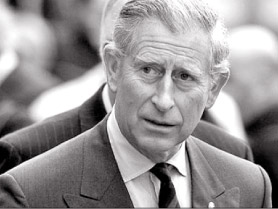
Prince Charles |
Praising the project, The Prince of Wales states in his foreword: “I
am delighted to see the success of the initiative called 1001
Inventions, which presents and celebrates the many scientific,
technological and humanitarian developments shared by the Islamic world
and the West.”
The Prince of Wales also states: “It is a matter of great pride that,
although global in its outreach and operation, 1001 Inventions is in
fact an initiative of a British-based team supported by a network of
academics around the world.”
1001 Inventions highlights how many of the most important scientific
and technological discoveries and building blocks of modern civilization
came out of Muslim society during the centuries after the fall of
ancient Rome - a period known as the ‘Dark Ages’ in European
civilization. However, while the Western World was in the doldrums, a
“knowledge revolution” was occurring in the Muslim world.
The new edition of the book, titled 1001 Inventions: The Enduring
Legacy of Muslim Civilization, is official companion to the blockbuster
1001 Inventions exhibition, which opened at the National Geographic
Museum in Washington, DC, last month. This third edition details
hundreds outstanding achievements and the pioneering minds behind them.
The book’s seven chapters are richly illustrated and provide insight
into everyday life across Muslim civilization and the related and
subsequent growth and progress of Western civilization. There is also an
extensive reference section, a glossary of subjects and people, charts,
timelines and maps illustrating the inventions and contributions,
photographs, artifacts, historic documents and drawings.”
Ahmed Salim, Producer of 1001 Inventions, commented: “We are honoured
that The Prince of Wales has written the foreword for the latest edition
of the 1001 Inventions book. The Prince of Wales has, for many decades,
actively promoted greater awareness of the enormous impact that Muslim
Civilisation has had on our modern way of life, and he has publicly
recognised the enormous, yet under-appreciated, positive influence that
this era in history has on the world in which we live. We are grateful
for The Prince of Wales’ continuing support for the important work that
we are carrying out.”
1001 Inventions is an award-winning international science and
cultural heritage brand.
1001 Inventions is recognised as the global leader in popularising
awareness of the thousand years ‘Golden Age’ of Muslim Civilisation.
From the 7th century onward, within a civilisation stretching from Spain
to China, men and women of different faiths and cultures built on
knowledge from ancient civilisations, making breakthroughs that have
left their mark on our world.
Through its association with Abdul Latif Jameel Community Initiatives
and the UK based FSTC, 1001 Inventions has reached over 50 million
people around the world using award winning productions, films,
blockbuster exhibitions, books and educational resources.
Inter-cultural respect through cultural roots of science
|
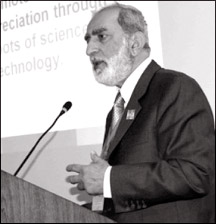
Professor Al-Hassani presenting his lecture |
We see much effort being expended on Inter-faith dialogues, which is
important. But there is a new space for dialogue which we believe may
have effective results in bringing cultures closer. Our Foundation is a
non-religious and non-political institution based in the United Kingdom.
By using world class research and surveying of the traditional media,
social media and school curricula, we discovered startling results.
There is 1000 years amnesia in the public mind and in particular amongst
the future generation. This amnesia affects the identity and behaviours
of people towards themselves and towards other communities. Almost all
people have perception that after the fall of the Roman Empire there was
an extraordinary dull period of a 1000years called the “Dark Ages”.
This is a misnomer, as for the thousand years after 600 CE there was
an extra-ordinary amount of scientific and intellectual activity that
radiated from Baghdad and along a glittering crescent through North
Africa and into Spain and Southern Italy.
For many years, people associate Baghdad with stories such as the
1001nights (or Arabian nights) and no information in the schools’
curricula or media about the enormous inventions and innovations from
that period which still affect our lives. Science and sport are
projected as entirely European with only European names of scientists,
jumping a 1000 years from the Renaissance back to the Romans and the
Greeks.
This gap is normally called “Dark Ages” or “Medieval Ages”. This
amnesia brings a big problem, as it breeds superiority Complex amongst
Europeans and Americans but it causes Inferiority Complex amongst other
cultures. We believe there is a need for a new language based on
cultural roots of science to discover connections between cultures to
create social cohesion and inter-cultural respect. If we look at history
using a religious lens we see conflict and hostility.
If we look at history using a political lens we again see wars and
struggle for authority. If, however, we use the lens of science, we see
cooperation and respect throughout humanity. Hence when we eliminate the
1000 years amnesia we not only have a logical continuity but also
dependence of cultures upon each other in the efforts to build the
civilisation of the present day. It demonstrates the famous saying by
Isaac Newton: “If I have seen further than others, it was because I was
standing on the shoulders of giants”.
|

The audience of the Forum listening to the presentations |
One of our recent initiatives is the “1001 Inventions” project. It
took up the challenge of using edutainment techniques to transfer
historical information trapped in library archives into the popular
domain, in particular the Global Digital Audience. An interactive
touring exhibition, accompanied by a book, a teachers’ pack, a website
www.1001inventions.com, a set of educational posters and a series of
lectures were launched in March 2006.
The information is conveyed by taking the viewer/reader/visitor into
a journey through zones showing such inventions, which we currently find
or use, in the home, school, hospital, market, town, world and universe.
The academic material is conveyed through a web portal
www.MuslimHeritage.com after the usual peer reviewing and rigorous
scrutiny for correctness and neutrality. This web portal has become the
number one source on all aspects of Muslim civilisation in particular
those relating to science, technology, art and sport.
I call upon the leaders of the countries participating in this summit
to give a serious thought to using the cultural roots of science and
sports to enhance respect and appreciation between their peoples.
Turmoil or transition
The stage of adolescence is often seen as a time of turmoil and
distress for both the teenagers and their parents.
Parents worry about what kind of friends their teen will have,
whether or not they will do well in school and decide to pursue their
education further, and how much “control” they will have over their
teen’s decisions. Greater fears include problems with drugs or alcohol,
trouble with the legal system, premarital relationships, and suicide.
In addition to all of these issues, Muslim parents would be concerned
about whether or not their adolescent will wear the hijab, perform
Salaah correctly and on time, fast during the month of Ramadhan, avoid
contact with members of the opposite gender, respect his/her parents and
other adults. Dealing with all of these worries can be less stressful if
a parent knows what to expect as their child enters this phase of
development.
Adolescence is generally considered to begin around the age of 12 or
13 and end at 18 or 19. It is a period of transition between childhood
and adulthood that is not at all universal. In many cultures and
societies there is no such phase of development since marriage and the
associated responsibilities occur at an early age. Adolescence is
present in other societies due to social, economic, and cultural factors
that produce a gap between the ability to reproduce biologically and the
societal expectations for reproduction.
As Muslims, we need to contemplate the validity of this stage since
we understand that accountability for our thoughts and actions begins at
puberty (Buloogh). This means that even though we may not be an “adult”
socially, we are considered to be one spiritually. Obviously this should
bring up all kinds of red flags and warnings for parents as they realize
that the task of parenting is mostly complete by the age of 12 or 13,
depending on when a child reaches puberty.
At that time, the youth will be completely responsible to Allah for
all that he/she does. This does not mean that being a parent ends at
that time, but it does highlight the significance of those early years
and the crucial role that parents play. We need to build a solid
foundation so that our children will make appropriate choices when the
time comes.
For those who are in a society where adolescence is regarded as a
distinct developmental phase, it is beneficial to understand some of its
general characteristics.
The perception that this time in life is one of turmoil and distress
is related to the commonly held belief that parent-adolescent conflict
is inevitable and that the difficulty will continue until the adolescent
leaves home.
Although this does occur in some families, it should not be
considered the norm. Disagreements will obviously arise as the
adolescent begins to assert his/her need for independence and control,
which is accompanied by expanding cognitive ability and an emerging
self-identity.
Parents should respect their teenager’s choices and foster his/her
sense of responsibility, as long as the choices are not contrary to the
principles of Islam. Youth should also be taught the fundamental Islamic
value of being obedient and respectful to parents at an early age so
that when correction is necessary it will be readily accepted. The use
of these two strategies should be effective in preventing any serious
parent-adolescent conflict from occurring.
A positive note is that research has shown that although adolescents
and their parents may differ about details of everyday life, they
generally agree on issues related to basic values. This is another red
flag to signify that we should be aware of the values that we are
teaching our youth. Courtesy Council of Muslim Theologians, Durban
To be continued |





